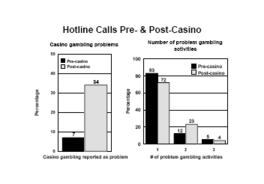A meta-analysis of disordered gambling found that rates of disordered gambling among adults sampled from the general population in the United States have increased over time [1]. This effect, called a period effect, represents a specific era in time associated with a higher prevalence of pathological gambling. One possible hypothesis regarding this effect is that as new gambling opportunities are introduced into a region, rates of disordered gambling will increase. This hypothesis implies that as individuals are attracted to new gambling opportunities, those who are most vulnerable will develop gambling problems. New Zealand researchers recently explored the rate and profile of gambling hotline phone calls during a twelve month period, six months before and six months after the opening of a new casino in Auckland [2]. A total of 1,336 first-time callers used the hotline in the one-year period; 54.8% were individuals with a self-identified gambling problem, and 45.2% were significant others of a problem gambler. Most problem-gambler callers (70%) were male and forty years of age or younger (73%). A disproportionately high number of problem-gambler callers were Maori (24%), the indigenous people of New Zealand. The total number of hotline calls was higher (826 vs. 510) for the six month period following the opening of the Auckland casino than for the six month period prior to the casino opening. The majority (76%) of new callers reported having a problem with a single gambling activity. In the first six months, 7% of the callers reported their primary problem gambling activity as casinos, and in the second six months 34% of callers identified their primary problem gambling activity as casinos. After the introduction of the new casino, a higher percentage of callers indicated having two problem gambling activities (23%) than prior to the new casino (12%). The patterns found by this examination of hotline calls provide data indicating a possible association between a new gambling opportunity and increased problems with that opportunity among a subgroup of the population. The new casino provided information about the problem gambling hotline, which might in part explain the rise in calls to the hotline after the casino opened. Another complication of this association is that the new casino was the second casino in New Zealand; the first casino opened two years prior to the Auckland casino, and the hotline was a national gambling crisis telephone hotline.
Sources:
- Shaffer, H.J., Hall, M.N., & Vander Bilt, J. (1997). Estimating the prevalence of disordered gambling behavior in the United States and Canada: A meta-analysis. Boston, MA: Harvard Medical School Division on Addictions
- Sullivan, S.G., McCormick, R., Sellman, J.D. (1997). Increased requests for help by problem gamblers: Data from a gambling crisis telephone hotline. New Zealand Medical Journal, 110(1053), 380-383.
This public education project is funded, in part, by The Andrews Foundation.
This fax may be copied without permission. Please cite The WAGER as the source.
For more information contact the Massachusetts Council on Compulsive Gambling,
190 High Street, Suite 6, Boston, MA 02110, U.S.





